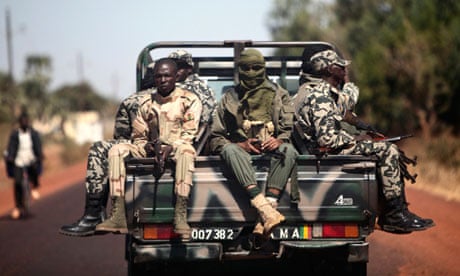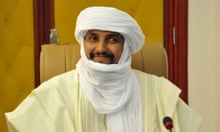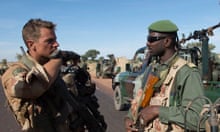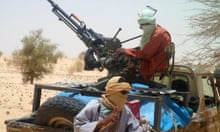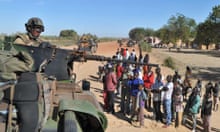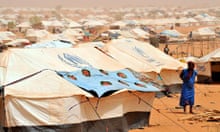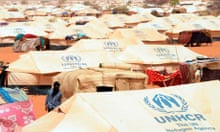There are growing reports of extrajudicial killings and other human rights abuses in Mali, as troops battle Islamist militants in the west African country.
Residents of Mopti, in the centre of the country, told the Observer of arrests, interrogations and the torture of innocents by the Malian army of those mistakenly suspected of involvement in rebel activity. "One day my son just disappeared," said a woman from the Fulani ethnic group, who asked not to be named. "We looked for him there for two or three days, but couldn't find him. Then some people told us that on the day he left, the army shot two people and put them in a pit inside the military base."
The victim's cousin, who also asked to remain anonymous for fears of reprisals, said: "We are Fulani people, the soldiers can tell from our dress that we come from the north.
"Because of that, the army suspects us – if we look like Fulani and don't have an identity card, they kill us. But many people are born in the small villages and it's very difficult to have identification.
"We are all afraid," the cousin continued. "There are some households where Fulanis or others who are fair-skinned don't go out any more. We have stopped wearing our traditional clothes – we are being forced to abandon our culture, and to stay indoors."
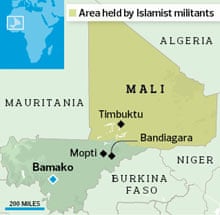
Amnesty International says that it has documented evidence of abuse by the Malian army, including extrajudicial killings. It says that in September, a group of 16 Muslim preachers composed of Malian and Mauritanian nationals were arrested then executed by the Malian military in Diabaly. Some commentators in Mali speculate that the occupation of Diabaly by Islamist fighters – whom French and Malian soldiers said they had defeated on Friday – was sparked by vengeance for the actions of the Malian army there.
The Observer asked Mali's minister of justice, Malick Coulibaly, whether the government believes Malian troops may be guilty of war crimes. "No army in the world is perfect," said Coulibaly, speaking at his office in Bamako. "The US army is one of the most professional in the world, yet they have been found to have committed acts of torture and unlawful killings. That exists in all armies."
Fears of human rights abuses come as offensives by Malian and foreign military forces are beginning to gain pace in north and central Mali. On Saturday French foreign minister Laurent Fabius called for a faster deployment of other African forces, before a meeting of African leaders in Ivory Coast. Around 5,000 African soldiers are expected to join the French forces in Mali. So far several hundred Nigerian and Togolese troops have arrived.
But analysts link the war in Mali and the kidnapping crisis in Algeria, and predict a possible terror threat throughout the west African sub-region, where a tradition of religious tolerance and lack of security makes many cities soft targets.
"This situation is going to get messy and stay messy," said Andrew Lebovich, a Dakar-based researcher on the Sahel and north Africa region. "I don't know if there will be a wave of attacks in west Africa, but I do think that what just happened in Algeria is a sign. I think it may get worse before it gets better."
In Mali, tension from the war and troubled security situation is prompting concern that civilians could take the law into their own hands. The traditionally nomadic Tuareg population, many of whom are among the hundreds of thousands of refugees sheltering in neighbouring countries, have been singled out for reprisal attacks. Amnesty says that it has evidence of extrajudicial killings of Tuareg civilians, indiscriminate shelling of a Tuareg nomadic camp and the killing of livestock, on which the nomadic population rely for survival.
"It's true that people feel very angry towards the Tuaregs, and we are concerned about that," said Coulibaly. "We are looking into measures we can take after the war to repair these relations."
Relations with Mali's Tuaregs – estimated to comprise between 3% and 10% of the population – have been in crisis since Tuareg separatists were accused of killing Malian soldiers last year in the northern town of Aguelhok, one of the factors sparking the 22 March coup.
The resulting power vacuum in Bamako then led to a Tuareg–led offensive, which resulted in northern Mali first falling under Tuareg control, then under the Islamists, splitting the nation. The government also fears the general population could carry out revenge attacks on individuals they believe are involved in Islamist activities.
The Observer has learned that the director of Sonef, a bus company, has been arrested by authorities after one of the company's buses was used by Islamist rebels in a planned attack. "We arrested the director and some of his staff primarily for their own security," said Coulibaly. "They are being detained at the gendarmerie in the north where they are also being questioned."
This month there were reports that Islamists used a bus belonging to the company to drive into Konna, before seizing the town. It is one of numerous alleged war crimes of which the Islamists are accused, and comes after the international criminal court last week announced that it was launching an investigation into events in the country.
"It is the government of Mali who requested the ICC launch an investigation into crimes committed here," said Coulibaly. "I personally went to The Hague and formally requested the ICC's involvement. We are already aware of acts that we believe constitute crimes within the court's jurisdiction, such as the attack at Aguelhok, the mass rapes at Gao and Timbuktu, and the destruction of our cultural heritage."
Evidence of crimes by rebel groups during their control of the north is expected to emerge now that bombing around the northern cities of Gao, Kidal and Timbuktu has loosened their grip on power.
"We have gathered a lot of evidence of sexual crimes committed by the rebels," said Sékou Konaré of the law advocacy group the International Federation for Human Rights. "I have just returned from the north, where I obtained medical proof from victims. We have medical certificates which show their injuries. It is well documented."
"Right up to when the bombings started, the Islamists were beheading people in Konna," said Amadou Bocar Teguete, the vice-president of Mali's national commission for human rights. "We still don't know the full extent of this, but we have had people on the ground there."
